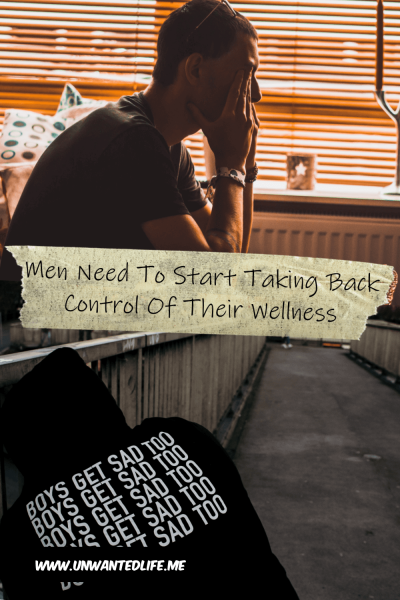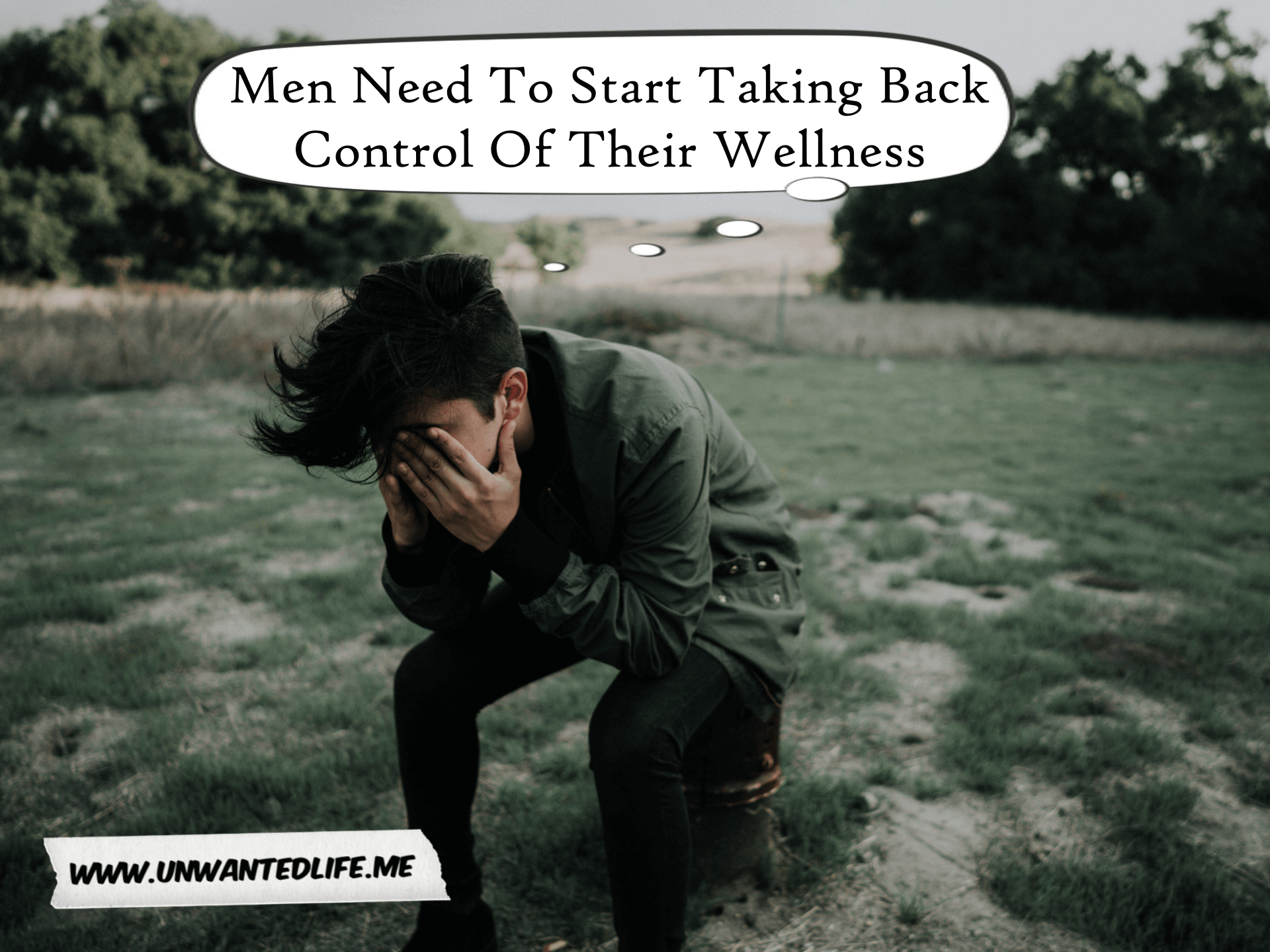After reading the article on bulimia that I happened upon on the Men’s Health website, which then led to me writing two blog articles on the subject (One Man’s Battle With Bulimia: An Article Discussion and Did Poor Mental Health Cause My Unhealthy Relationship With Food?). I decided to have another look at what other articles they’d covered that might also be interesting. In doing so, I found this article “Why Men Need to Start Taking Back Control of Their Wellness” which I thought I’d briefly talk about and share with my readers. Because men’s wellness is important.
Men are three times more likely to take their own lives than women
The article offers some pretty shocking statistics about male mental health, and of the three people I know who have successfully killed themselves, they were all male, the person I witnessed trying to kill themselves, too was male, and then there’s me and my unsuccessful attempts to end my life. I know anecdotal evidence doesn’t really prove anything, but that’s been my experience with suicide so far, an all-male affair. Granted, there could be people I used to know who have tried and succeeded or didn’t succeed in their suicide attempts who were female. I’m just unaware of that fact: hence anecdotal evidence not really being proof of anything.
Men in mid-life remain overwhelmingly dependent on a female partner for emotional support
I don’t know why men have been raised to bottle everything up, to just “play through the pain”, or “man up” because it’s literally killing us. I know I struggle with doing what’s right and healthy for me, to seek help, to reach out to people, due to being raised on the idea that this is not what men do, we go it alone like the lone wolves we are, stoic in our manliness.
My partner wants me to share more about my suicidal thoughts, but I’ve suffered from those thoughts since I was eight years old. It’s a daily thought process for me. It just never leads to taking action anymore. Even though I had a pretty massive breakdown over the summer that pushed me to the very brink of enacting my suicidal thoughts, I still didn’t reach out to my partner.
Marriage breakdown is more likely for men to lead to suicide
I don’t see the point in sharing all the darkness inside of me with my partner, causing them to worry about me all the time because there’s nothing they can do to help me. I know this is an unhealthy way to be, and I probably should share it all with them. I just don’t believe theirs any point in sharing it unless they can do something to help.

On the flip side of that, if someone asks about my mental health or physical health, I’ll answer honestly about my problems because I don’t see the point of lying about it. I have no issues discussing my problems with anyone who wants to listen. I just don’t want to burden them with knowledge of my problems and my situation unless they can help tackle them. Who wants to know your loved one struggles with daily suicidal thoughts while knowing they’re powerless to do anything about it? That, to me, seems like a terrible burden for me to place on someone.
There is one exception: I’ll discuss my problems with others if I feel it’ll help them in some way, rather than it being just if they can help me or if they’ve asked about it. If my experiences can help someone else, then at least something worthwhile has come out of it.
When it comes to our wellness, we approach it with caution. After all, wellness is a women’s thing, right?
The article goes on to talk about the importance of talking about such ignored male issues as testicular self-exams and erectile health, which obviously can be a source of shame and embarrassment, but at the same time, talking about it and seeking help for it can lead to having a better quality of life, after all, Viagra is there for a reason, so theirs no reason to let your sex life suffer.
So grab your balls and check for lumps. Most men are already playing with them anyway, so you may as well check they’re in prime condition while you’re at it. Because looking after ourselves is more than just making sure we’re not getting too fat, about building muscle and eating our five a day, it’s also about looking after your mental health, coping with stress, and reaching out for support before you find yourself in a crisis situation.
Although this article is aimed at a male audience, everyone should try to look after their complete health, not just worry about their weight, although such things as testicular health may not apply to all of you. So prioritise your own wellness and wellbeing if you want to live a better quality of life.
Wellness and wellbeing aren’t dirty words, or just words used in marketing. So take time for self-care, you’re worth it. Everyone is worth it.
As always, leave your feedback in the comments section below. Also, feel free to share your experiences of male wellness in the comments section below as well. If you want to stay up-to-date with my blog, then sign up for my newsletter below. Alternatively, get push notifications for new articles by clicking the red bell icon in the bottom right corner.
Lastly, if you’d like to support my blog, then you can make a donation of any size below as well. Until next time, Unwanted Life readers.


I absoluetly love this post! I try to tell my fiance that he needs too take better care of himself and worry more about his health and he refuses to go to doctors. I’m going to show him this post!
I’m glad you enjoyed reading it, and I hope your fiance does learn to take better care of himself
You are doing a great job of raising awareness for men’s physical and mental health.
Thank you
very nice… i really like your blog…
Thank you
Men’s mental health is a topic that doesn’t get a lot of attention, it feels. Because, as you said, it’s not common to talk about our vulnerabilities or anxieties. We should deal with it and move on.
When going through a break-up, I soon realized that I had to set some rules for myself to deal with it in a healthy way. I wrote about them in my blog, but one of them was staying away from alcohol. I also started eating better and getting in shape. I figured, at least I an do somehing about that right now. What really helped me was reading. That’s how I learned about Stoicism and philosophy. This helped me examine my insecurities and found a way to accept them and deal with them. That’s why I think that sharing these stories and experiences is extremely important. It tells men that they are not alone. Thank you for sharing!
All too often men turn to alcohol to solve their problems, but it doesn’t help, and only makes things worse. Avoiding that will definitely help, as will learning that talking to others isn’t a weakness. Thanks for sharing your experience
This post should be read by every man, or woman for that matter. Men’s mental health needs more attention and understanding. Sharing stories and experiences like this one can help show others that they are not alone. We don’t have to deal with it alone. It shows strength to share
There is a growing movement trying to get men to take their mental health and health seriously, but it’s hard to undo the conditioning of the older generation to “be a man”
Men’s mental health is a huge issue, great post, thank you
Indeed it is, and there’s a lot of work that still needs to be done regarding that
This post should be plastered all over so it could reach to all. And I think that is time to see that when men take care if them and reach out for help when needed – it is really “manning up”. Not when they are hiding their pain or ignoring it.
It benefits no one to hide our pain or trying to ignore it. Thanks for sharing your thoughts
The statistics are true. The highest suicide rate is males from 45 to 49. That’s men who could be deep within a lonely relationship and long-term job, who are getting older and losing passion for life. There can be all sorts of reasons, but the important issue, and what you raise here, is to talk honestly. This is something most men I know don’t know how to do. In my case, when I opened up about my condition, I was shunned and thought of as weird. I don’t relate wanting to commit suicide as being weird, but that is the stigma we faced then, more than ten years ago, and still face. Keep talking. There is a charity for men https://www.letsgetmentalking.com/
Unfortunately, just as men find it difficult to talk about such things, others don’t know how to behave when they do. But areas need to be talked about